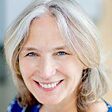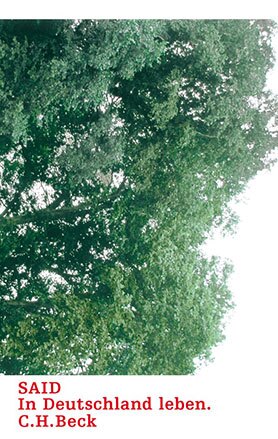Said
In Deutschland leben. Ein Gespräch mit Wieland Freund
[Living in Germany. A conversation with Wieland Freund]
- C.H.Beck Verlag
- Munich 2004
- ISBN 3-406-51711-0
- 127 Pages
- Publisher’s contact details
Said
In Deutschland leben. Ein Gespräch mit Wieland Freund
[Living in Germany. A conversation with Wieland Freund]
This book was showcased during the special focus on Arabic I (2004 - 2005).
Sample translations
Review
The subject is not all the world and his brother but his life in Germany that SAID talks about with journalist Wieland Freund, a German easily twenty years his junior. There is much that sets the two men apart from each other, yet their conversations unfold in an atmosphere of agreement that permits digression without losing their sense of direction.
In two introductory chapters prefacing the actual conversations, SAID remembers his childhood in Iran, he tells of leaving his homeland, an event both painful and liberating, and he describes his first impressions following his arrival in Germany. Initially it is not just the country, but also and especially the German language that represents for him first exile, then asylum, and finally a kind of homeland. SAID recounts with sensitivity and intensity how, after years of political work in the organization of Iranian university students, he turns more and more to language and literature, directing his interest to “German life” — a step, on the one hand, which alienates him from old friends but, on the other, allows him an increasing receptivity to the new language. Thus German becomes his “refugee shelter,” and he begins to write in it.
The epilogue to the book evokes this experience of a life in two languages and two worlds. Here SAID writes with rich poetic imagery — in a very different style yet no less clearly — of his thoughts, questions, fears, and dreams. Most of the time it is “the child” who speaks, other times the foreigner, the adolescent, the exile, or the mature refugee. They speak of the difficulties of arriving in Europe, of Orient and Occident, and of America. It is a lyric and touching monologue with which SAID the man and the poet concludes his book.
Framed between these two very dissimilar texts is his conversation with Wieland Freund. More accurately, there are five conversations on five different subjects. Although each makes reference to the others, each can as easily be read for itself. The topic of the first conversation is “the German” (“who does not actually exist”). SAID’s many detailed observations on the behavior, nature, and soul of the German (“who does not actually exist”) give expression to one thing above all: an affection for and trust in the people with whom he has been living now for almost forty years. That does not prevent him from describing — sometimes with a sly wink and sometimes quite seriously — certain characteristics that should prompt a critical self-examination on the part of his (German) readers.
Two of the conversations have to do with very concrete events in postwar German history, which SAID experienced as a contemporary and at the same time as an observer with a particular perspective. First there are his experiences in connection with the Shah’s visit to Germany in 1967 and the student protest movement sparked by it. The other event was the opening of the GDR’s borders and the reunification of Germany. Both occurrences moved him profoundly, but while the conversation on 1968 and its aftermath, farther removed in time, is a soberly weighed account, emotion plays a decisive part on the topic of reunification. In their discussion of 1968, Wieland Freund, younger and a member of the “Gulf War generation,” as he calls himself, asks the eyewitness SAID about the earlier generation’s relationship to America, about the student movement’s fascination with violence, about its notions of authority and opposition to authority; and SAID gives the younger man insight with the benefit of distance. But when the subject turns to the “Fall of the Wall,” their conversation takes a different course. Here we find two keen observers exchanging views on the intra-German response to this enormous change, on the uncertain role of the political left in the former West Germany, the prejudices on both sides which collided after the initial wave of euphoria, and the complexity and originality of the movement which led to the opening of the GDR.
A more basic conversation is the one on literature and politics. In response to Freund’s opening question whether literature should be political, the writer replies wisely: It can be, but it doesn’t have to be. There are repeated references to Günter Grass and his role in public politics and to his ambition even of having an official role in top-level politics. But “a writer doesn’t know the ways of politics.” Thus SAID affirms — for himself as well — the often-cited retreat into the private sphere which followed the moralization of literature by the writers’ organization, Group 47, and its subsequent politicization by the student protest movement. SAID allows room for contradictions: The relationship of politics to culture, and particularly the relationship of the Social Democratic Party to culture, is one that he characterizes as insecure. But his esteem for Willy Brandt, “the only cosmopolitan” among Social Democrats, is in no way diminished by Brandt’s preference for marches and popular music.
SAID’s deep, fundamental confidence in the German democracy of the new Berlin Republic is clear in the final conversation. In his opinion, the situation after 1989 offered, for the first time in German history, the chance to begin a process of normalization from its own resources and under its own authority, with all the advantages and disadvantages that accompany such a normalization. He regards the uncertainties of a society not just as an opportunity, but indeed as a precondition for reorientation. Even though it may go slowly at first, he is nonetheless convinced: “This country will always find its way.”
This book tells what Germany in the last forty years has been, and is, for SAID the refugee, the Iranian student activist, the poet. One’s home is where one understands and is understood, Karl Jaspers once said. Here SAID shows how thoroughly he has made Germany his home: He understands, and he makes himself understood.

In two introductory chapters prefacing the actual conversations, SAID remembers his childhood in Iran, he tells of leaving his homeland, an event both painful and liberating, and he describes his first impressions following his arrival in Germany. Initially it is not just the country, but also and especially the German language that represents for him first exile, then asylum, and finally a kind of homeland. SAID recounts with sensitivity and intensity how, after years of political work in the organization of Iranian university students, he turns more and more to language and literature, directing his interest to “German life” — a step, on the one hand, which alienates him from old friends but, on the other, allows him an increasing receptivity to the new language. Thus German becomes his “refugee shelter,” and he begins to write in it.
The epilogue to the book evokes this experience of a life in two languages and two worlds. Here SAID writes with rich poetic imagery — in a very different style yet no less clearly — of his thoughts, questions, fears, and dreams. Most of the time it is “the child” who speaks, other times the foreigner, the adolescent, the exile, or the mature refugee. They speak of the difficulties of arriving in Europe, of Orient and Occident, and of America. It is a lyric and touching monologue with which SAID the man and the poet concludes his book.
Framed between these two very dissimilar texts is his conversation with Wieland Freund. More accurately, there are five conversations on five different subjects. Although each makes reference to the others, each can as easily be read for itself. The topic of the first conversation is “the German” (“who does not actually exist”). SAID’s many detailed observations on the behavior, nature, and soul of the German (“who does not actually exist”) give expression to one thing above all: an affection for and trust in the people with whom he has been living now for almost forty years. That does not prevent him from describing — sometimes with a sly wink and sometimes quite seriously — certain characteristics that should prompt a critical self-examination on the part of his (German) readers.
Two of the conversations have to do with very concrete events in postwar German history, which SAID experienced as a contemporary and at the same time as an observer with a particular perspective. First there are his experiences in connection with the Shah’s visit to Germany in 1967 and the student protest movement sparked by it. The other event was the opening of the GDR’s borders and the reunification of Germany. Both occurrences moved him profoundly, but while the conversation on 1968 and its aftermath, farther removed in time, is a soberly weighed account, emotion plays a decisive part on the topic of reunification. In their discussion of 1968, Wieland Freund, younger and a member of the “Gulf War generation,” as he calls himself, asks the eyewitness SAID about the earlier generation’s relationship to America, about the student movement’s fascination with violence, about its notions of authority and opposition to authority; and SAID gives the younger man insight with the benefit of distance. But when the subject turns to the “Fall of the Wall,” their conversation takes a different course. Here we find two keen observers exchanging views on the intra-German response to this enormous change, on the uncertain role of the political left in the former West Germany, the prejudices on both sides which collided after the initial wave of euphoria, and the complexity and originality of the movement which led to the opening of the GDR.
A more basic conversation is the one on literature and politics. In response to Freund’s opening question whether literature should be political, the writer replies wisely: It can be, but it doesn’t have to be. There are repeated references to Günter Grass and his role in public politics and to his ambition even of having an official role in top-level politics. But “a writer doesn’t know the ways of politics.” Thus SAID affirms — for himself as well — the often-cited retreat into the private sphere which followed the moralization of literature by the writers’ organization, Group 47, and its subsequent politicization by the student protest movement. SAID allows room for contradictions: The relationship of politics to culture, and particularly the relationship of the Social Democratic Party to culture, is one that he characterizes as insecure. But his esteem for Willy Brandt, “the only cosmopolitan” among Social Democrats, is in no way diminished by Brandt’s preference for marches and popular music.
SAID’s deep, fundamental confidence in the German democracy of the new Berlin Republic is clear in the final conversation. In his opinion, the situation after 1989 offered, for the first time in German history, the chance to begin a process of normalization from its own resources and under its own authority, with all the advantages and disadvantages that accompany such a normalization. He regards the uncertainties of a society not just as an opportunity, but indeed as a precondition for reorientation. Even though it may go slowly at first, he is nonetheless convinced: “This country will always find its way.”
This book tells what Germany in the last forty years has been, and is, for SAID the refugee, the Iranian student activist, the poet. One’s home is where one understands and is understood, Karl Jaspers once said. Here SAID shows how thoroughly he has made Germany his home: He understands, and he makes himself understood.
Translated by Michael Ritterson

By Heike Friesel
